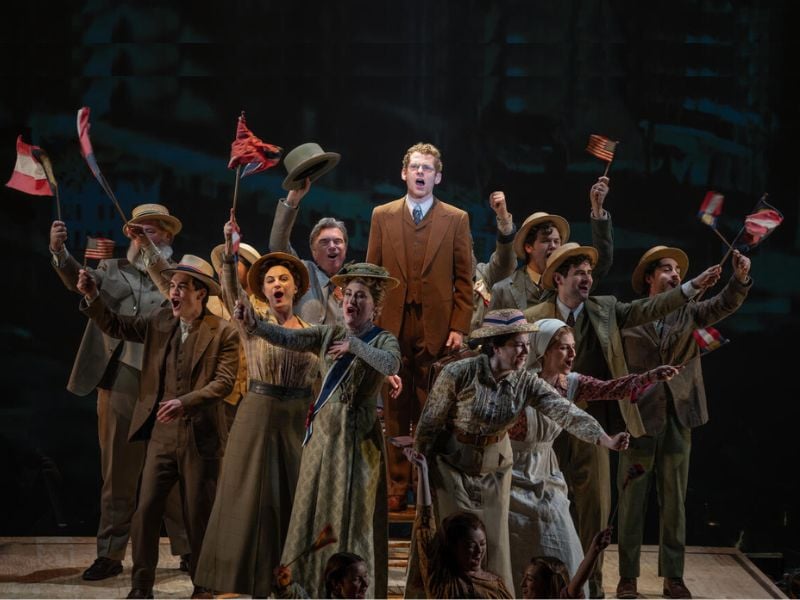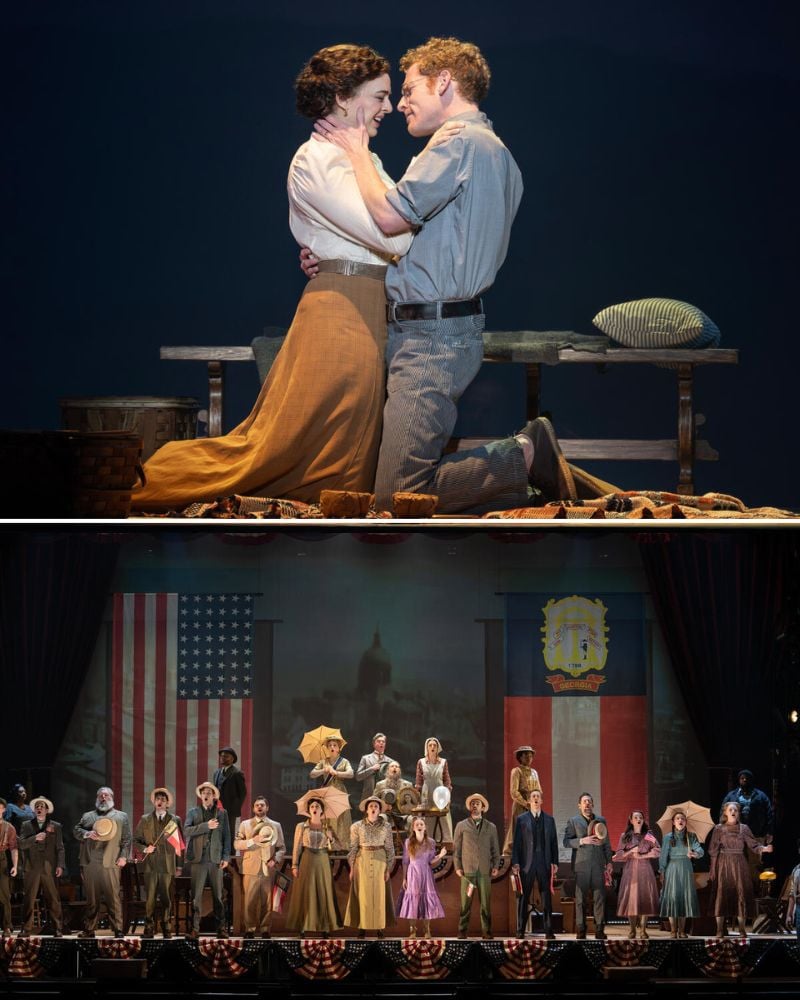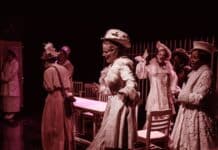Parade makes no pretense to be a lighthearted, toe-tapping musical. From the outset, it is blunt about its subject matter: the wrongful murder conviction and lynching of Leo Frank, a Jewish factory manager in Atlanta in 1915. With a book by Alfred Uhry (Driving Miss Daisy) and music by Jason Robert Brown (The Last Five Years, The Bridges of Madison County), the show originally played on Broadway in 1998, winning Tonys for Book and Score. This revised touring production is based on the 2023 version, which won Best Revival and Best Direction of a Musical.
It is more relevant than ever.

The first act is a relentless, riveting carnival of injustice. Set after a prologue in which a Southern soldier (Trevor James) says goodbye to his lady-love before going off to fight the Yankees, the context is clear. The title Parade refers to an annual celebration of Confederate Memorial Day, in the 50th year of which a 13-year-old factory worker, Mary Phagan (Olivia Goosman), is raped and murdered in Frank’s factory.
Suspicion first falls on the African American night watchman of the factory, Newt Lee (Robert Knight), interrogated in a nauseating scene where a detective tries to get him to admit he “couldn’t help himself when he smelled that white girl.” But he is released because, as the ambitious prosecutor Hugh Dorsey (Ethan Riordan), who has lost his last two murder cases and needs a win, puts it, “Hanging another Nigra ain’t enough this time. We gotta do better.” He and his cronies set their sights on Leo Frank (Max Chernin), a white, college-educated, well-to-do Jew from the North — the ultimate outsider.
The trial presents a parade of perjury from witnesses they have threatened or bribed, such as the coached factory girls who condemn Frank simply by saying he “looked at them”; the factory janitor, the vicious, suspicious, escaped convict Jim Conley (Ramone Nelson), who claims he helped Frank hide the body; and the tearful mother of the victim, who says coldly to the accused, “I forgive you, Jew,” and means precisely the opposite. The most unsettling parts of the first act are when Chernin gets up and acts out these slanders as the prosecution’s fantasy of Frank, especially in the sleazy number “The Factory Girls/Come Up to My Office.”
Meanwhile, crooked politicians, preachers, and journalists are whipping the populace into a frenzy of hatred. The white-suited, Bible-thumping, antisemitic publisher Tom Watson (Griffin Binnicker) claims to want justice but offers to throw his political weight behind anyone who can get Frank hanged. The slimy reporter Britt Craig (Michael Tacconi) sees the trial as his career-making story, ironically calling Frank his “savior” and vowing to “give him fangs, give him horns, give him scaly, hairy palms!… Yeah, that fella’s here to rape the whole damned South!”
Inevitably, Frank is convicted and condemned to hang. In part of Director Michael Arden’s effectively claustrophobic staging, Frank spends the entire intermission in his cell on a platform center stage, emphasizing his entrapment.

The second act, thank goodness, brings some nuance, humanity, and character development to the show. Frank is forced to shed his cold and proper shell and realize he can depend on his wife, Lucille (Talia Suskauer) — in fact, he must, because he can’t save himself. Under the most awful circumstances, they move from arranged marriage partners to true lovers. Their deepening devotion is the emotional heart of the show. Lucille convinces basically decent Governor Slayton (Brian Vaughn) to look into the case, and as a result, he commutes Frank’s sentence from hanging to life in prison. But given the fury of the good people of Georgia, the deed costs him his job, and prosecutor Hugh Dorsey becomes Governor, while slimy publisher Watson becomes a Senator.
And, since the show has left no suspense as to how all this will end, a mob abducts Frank from jail, drives him to Mary Phagen’s hometown, and lynches him.
All of this is rescued from being unbearable by the staging, beautiful music, and performances.
Dane Laffrey’s set is fascinating, with a central wooden platform surrounded by ranks of miscellaneous wooden chairs and benches, where most of the cast sit during the action. There are no curtains in the wings, and one can see back to the walls and equipment. This gives the impression that the main characters are always being watched, not just by the audience, but by the public, the people of Georgia, the mob. There is the inescapable glare of publicity that nonetheless does not illuminate the truth.
The back wall is filled with projections by Sven Ortel, which move, subtly. While the audience is waiting for the show to begin, a street scene shows faint shadows of passing cars, and then begins to loom forward slowly but menacingly, zooming in on the historical plaque marking where Frank was lynched, and eventually on the single line: “Without addressing guilt or innocence, and in recognition of the state’s failure to either protect Frank or bring his killers to justice, he was granted a posthumous pardon in 1986.” In other words, even 73 years later, the State of Georgia cannot bring itself to proclaim Frank innocent. Other projections are similarly disturbing, such as the photographic evidence of Frank’s hanging, with several prominent citizens clearly in view — but somehow, the state could not bring Frank’s killers to justice.
The acting and voices are all excellent, in all registers, from Binnicker (Tom Watson)’s oily baritone, to Tacconi (Brit Craig)’s frenzied tenor, to Knight (Newt Lee)’s rich, despairing bass, to Suskauer (Lucille Frank)’s lovely but strong mezzo. Ramone Nelson stands out as the amused, powerful, and evil Jim Conley.
And Max Chernin excels in the demanding lead role, playing not only his own character, but its perverted reflection in his enemies’ eyes. Frank’s development, from a stiff, stand-offish number-cruncher, privileged and prejudiced in his own way, to a vibrant, loving, noble hero, even in the face of cruelty and death, redeems the show. His performance takes it from a grim catalogue of horrific injustice to a story with humanity at its heart.
But the injustice is still there. Frank’s story is true. Many of the people involved went on to long political careers. It formed the basis for both the founding of the Anti-Defamation League and the resurrection of the Ku Klux Klan. At the end of the show, a projection points out that Leo Frank’s murder case was reopened in 2019 — and that it is still ongoing. Leo Frank has yet to be exonerated.
Whether you see this show is up to you. You may not want to spend your money at the Kennedy Center right now. But these fine, talented, dedicated performers should not be punished for the prejudice of others. They are giving their all, bearing witness to injustice and the ongoing need for truth. You may want to do the same by seeing Parade.
Running Time: Two hours and 30 minutes, including one 20-minute intermission
Parade plays through September 7, 2025 (Tuesday through Sunday at 8 pm;
Thursday, Saturday and Sunday at 2 pm), in the Eisenhower Theater at The Kennedy Center for the Performing Arts, 2700 F St NW, Washington, DC. Purchase tickets ($49–$159) online, through TodayTix, or by calling (202) 467-4600 or toll-free at (800) 444-1324. Box office hours are Monday-Saturday, 10 am-9 pm, and Sunday 12 pm-9 pm. A limited number of $39 Rush tickets will be available for every performance at the Kennedy Center Box Office the day of the performance. Rush tickets become available 2 hours prior to each performance.
The program for Parade is online here.



